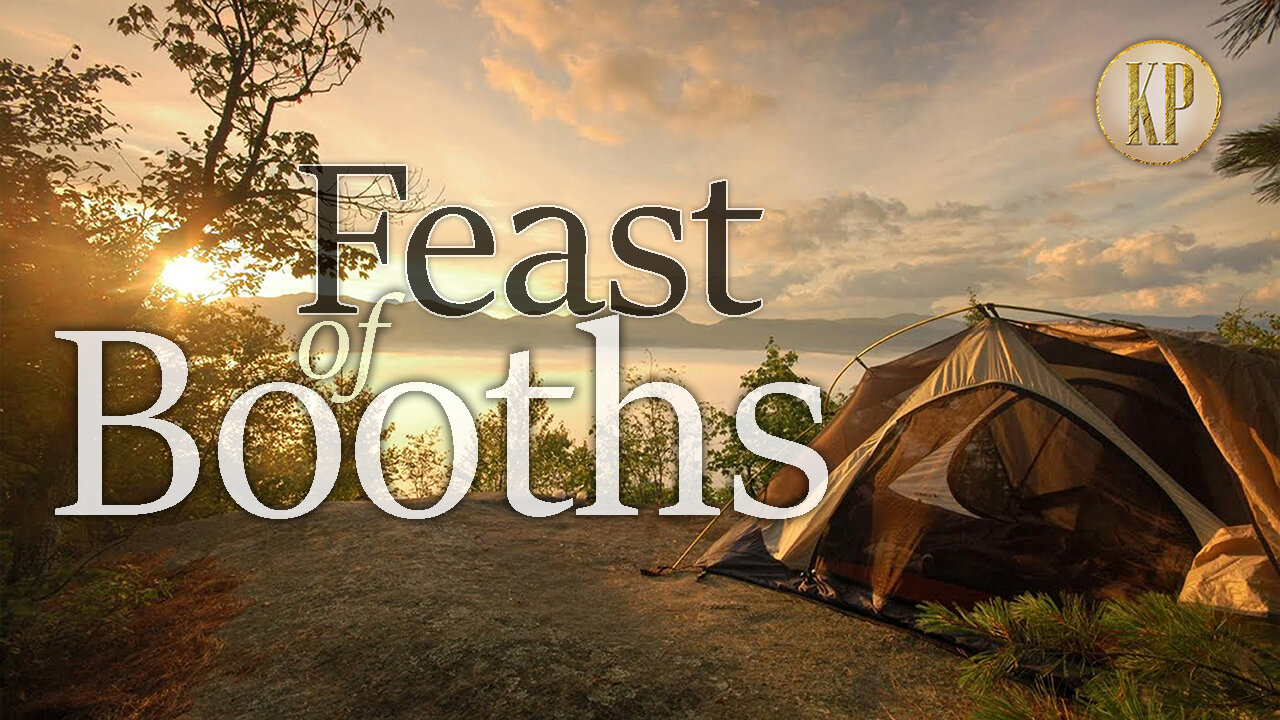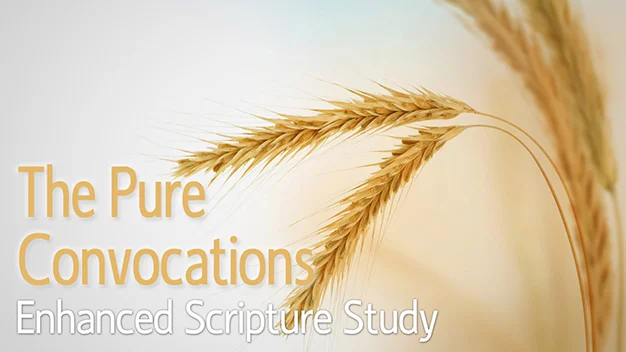The final festival of the Hebrew agricultural year is Feast of Booths, also known as Feast of Tabernacles, Feast of Ingathering, and Sukkot. It has special significance for the people of Yah, which is laid out in Leviticus 23:33-43. Though we have covered this feast in detail in the documentary film, The Pure Convocations, I have been inspired to provide additional points via this article. In that video we stated in the Recap portion that no one has to actually be in physical tents for this feast, since your body fulfills what the original booths or temporary dwellings pointed to. While we believe this is true in every sense, I have to stress that this in no way means that you should not reside in a temporary dwelling for this feast. If you are physically able to, by all means, we encourage you to memorialize this experience to the fullest, even though we cannot observe the feast to the exact letter of the law.
In verse 42 of Leviticus 23 we are told:
42 For seven days you must live outside in little shelters. All native-born Israelites must live in shelters.
—Leviticus 23
This was a command given to the people of Israel, but it came with other specifics, which cannot be fulfilled in the lands we have been scattered to. For one thing, as we’ve previously stated, “Yah used to choose the places where we held these feasts, as commanded in Deuteronomy 16:15. This required us to be a nation under Yah’s leadership. The places Yah eventually chose while we were a nation varied from Shiloh (Joshua 18:1), from which his spirit eventually departed (1 Samuel 4:22) to Jerusalem. His presence has since departed Jerusalem as well, and we are scattered in captivity. Therefore, we cannot keep this feast as scripturally commanded until we are gathered.”
This means that, in order to properly fulfill Leviticus 23, we cannot just shoot off a list of places where we’d like to observe this feast, gather there, pitch tents, and feel we are in perfect harmony with the letter of the law. This is why we stress the importance of fulfilling the spirit of the law, because the letter is impossible to fulfill in some cases. That said, verse 43 of Leviticus 23 gives us Yah’s reason for the observance of Feast of Booths. There we read:
43 This will remind each new generation of Israelites that I made their ancestors live in shelters when I rescued them from the land of Egypt. I am Yah your Elohim.
—Leviticus 23
Essentially, Yah wanted the people of Israel to depend solely on him. He wanted them to look to him for everything they needed, and in order to accomplish this feat it was necessary to remove them from their Egyptian comfort zone. In short, dwelling in temporary booths effectively stripped the Israelites of material comforts by forcing them to be away from the system, infrastructure, people, and things they relied on to round out their daily lives. And by dwelling in temporary booths, away from all of that, they were forced to pare down to the bare essentials, being as close to Yah as is possible on this side of the firmament. That is what our dwelling in temporary booths should remind us of, per Leviticus 23:43.
Yah basically invented the camping trip in other words, which the heathens also stole from us. If done correctly, this type of roughing it forces you to forego the trappings of life as you come relatively face to face with Yah. That is what Feast of Booths is all about. But what it represents—this dwelling in a temporary booth—is our sojourn on earth in these fragile bodies, which are at the mercy of Yah. We are so dependent on Yah that he must daily provide for us by offering up air, water, shelter, food, sunlight, etc., in order to keep us alive.
The emissary Peter intrinsically understood the concept of the body being a tent. In 2 Peter 1:13 he writes:
13 I think it right, as long as I am in this bodily tent, to stir you up by way of reminder. . . .
—2 Peter 1
He refers to his own body as a tent, the word here being G4638, skénóma, meaning, a tent pitched, a dwelling, tabernacle. Thayer’s Greek Lexicon adds: of the temple as Elohim’s habitation.
You see, our spirits are housed in these mortal bodies, and Yah wants to dwell in us as well. Hence we are temporary booths pitched to house spirits. And even demons wish to dwell in these tents! But I digress. At any rate, our bodies are also what the Feast of Booths point to. Moreover, our bodies are formed and destroyed by birth and death, which is pictured in the setting up and breaking down of the temporary booth or tent you are to dwell in. Yeshua himself said that he can lay down his life and take it up again according to John 10:18. His body was his temporary dwelling, and our bodies are ours. But they represent the temporary booths, or tents within which we are to celebrate with joy before Yah for seven days. This is a commandment, which is a stark contrast to what we’re supposed to do on the Day of Atonement and the eighth and Last Great Day of this particular feast (this is also explained in our documentary, The Pure Convocations).
Now, what is Leviticus 23:42 referring to when it says dwell in booths for seven days?
Let’s start with the word booth. It is from the Hebrew word sukkah, word H5521, which carries the sense:
2 booth, rude or temporary shelter, for cattle.
This word is used in Genesis 33:17 to great effect:
17 Jacob, on the other hand, traveled on to Succoth. There he built himself a house and made shelters (H5521, sukkah) for his livestock. That is why the place was named Succoth (which means “shelters”).
—Genesis 33
We are in temporary shelters in these bodies, and we are like cattle.
3 Why are we counted as cattle? Why are we stupid in your sight?
—Job 18
Another definition attributed to the sense booth is: “but also for warriors in the field (2 Samuel 11:11; 1 Kings 20:12, 16); for watchers in vineyards (Isaiah 1:8).” In other words, we are also to be warriors in the field in the sense that we are in the middle of a spiritual war while in these temporal bodies, and since we’re in the midst of a spiritual war we are commanded to watch and pray. So we are also watchers in Yah’s vineyard.
Leviticus 23:42 also commands us to dwell in these temporary booths we are to pitch during the feast. The word dwell is word H3427, yashab, which means to: sit down, remain, stay, tarry, dwell, have one’s abode in. While we can’t commemorate this feast to a tee according to the letter, we can do physical things according to Scripture to lock our minds and hearts to the experience of our forefathers who had to live in temporary booths in the wilderness. For our time and circumstance, this could translate to living outdoors in a tent that is absent modern conveniences for that week, or any temporary structure that can be set up and broken down by you. This represents the birth and death of the body that is dependent upon Yah; the body that you are housed in. It also mirrors the experience of the ancient Israelites, which we are to reflect upon throughout the feast.
Finally, I’d like to address Leviticus 23:25, where it is stated:
25 You must do no ordinary work on that day. Instead, you are to present special gifts to Yah.
—Leviticus 23
Some translations term this: “You shall present an offering made by fire to Yah,” or “a food offering.” When Yah says bring special gifts to him, this usually represented animal sacrifices and offerings, as pictured in verse 37 of this same chapter:
37 These are Yah’s appointed festivals. Celebrate them each year as official days for pure assembly by presenting special gifts to Yah—burnt offerings, grain offerings, sacrifices, and liquid offerings—each on its proper day.
—Leviticus 23
Now we’ve covered the spiritual application of sacrifices in part 2 of our Spirit of the Law scripture study series, the video of which can be found on our website and YouTube channel. But what was not said in that video is this: the book of Psalms points us to the spiritual equivalent of the very sacrifices and offerings they presented to Yah in the past. Today, those special gifts are represented quite differently, and Yah, through his servant Asaph, gives us the perfect example of the special sacrificial gifts he requires of us at these feasts. In the Psalm 50:23 we read:
23 The one who offers thanksgiving as his sacrifice glorifies me; to one who orders his way rightly I will show the salvation of Elohim!
—Psalm 50
In closing, whenever we are commanded to present special gifts or sacrifices to Yah on any particular feast day, what we are to do is come before him with prayers of thanksgiving. Rather than ask him for things or send up our grievances, we should simply thank him throughout the feast in question for the many blessings he has bestowed upon us and for the wonderful and mighty works he has done in our lives. That said, may your feasts be blessed! Shalom.






